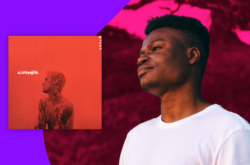Iss 814 picks up the phone saying, “Hey, hey, I’m here – I’m making some African electro right now.”
Before too much time passes, he sends a private SoundCloud link and says to call him back once I’ve listened. And so begins a day of texting and talking between myself and Iss 814, Dakar’s prolific contemporary music producer.
Guédiawaye is an oceanside suburb of Dakar where Iss was born and lives today. He estimates that over 5,000 of Dakar’s people are rappers. “And I supply all the beats,” he says. The 30-year-old producer has made records for Dip Doundou Guiss, Akhlou Brick, Samba Peuzzi, Fou Malade, Keur Gui, and more. He credits a public arts space called G Hip Hop as a hotbed for collaboration that attracts both musicians and music lovers. “But it’s not hip hop alone,” he notes. “Youssou N’Dour is one of the greatest artists in the world and is from here. He makes mbalax music, not hip hop. That’s the music I grew up on, and it’s wild – very rhythmic with heavy percussion.”
It’s not surprising that Dakar Trap comes from someone born when mbalax was the most beloved form of music, but Iss came of age in the 90s, when a mass cultural diffusion was happening around the world and especially in Dakar: the internet was turned on in Senegal in March of 1996 and hip hop gained prominence shortly thereafter with acts like Positive Black Soul, MC Solaar, Akon, and Rap’Adio.
In the same decade the internet turned on, popular music changed from mbalax to hip hop and Iss was in his late teens listening to it all shift, meld, and fuse. His deference to traditional musicians is touching; “The energy that they’ve got – nobody has it, I swear to God,” he remarks. “70 years old and they play music like no one else. It’s amazing.”
He identifies access to traditional musicians and recordings as one of the biggest opportunities and differentiators of Senegalese and West African music as a whole. “It’s not about money here. It’s about being inspired and bringing West Africa to the world. If you listen to the music from Ghana, Nigeria, it’s all the same. Colonization divided us, but we are all one.”
Iss cites one of the biggest problems facing Senegal’s musicians as a lack of an industry, or a lack of ways to sell and monetize one’s music. But as musics of the West African diaspora continue to rise in popularity, he feels hopeful. “The western music scene is full. We need to develop our own styles and spread that sound. If we want to go global, we need to develop our own sound with the same quality.”
Iss 814’s sample pack is called “Dakar Trap,” and is a part of “Splice Sessions: Senegal.” “I’m doing it for Senegal, for West Africa, Guediawaye, for the world,” he says. “It’s big. I want to inspire the world.”
Incorporate the sonic building blocks of Dakar Trap into your own productions:
March 9, 2020



